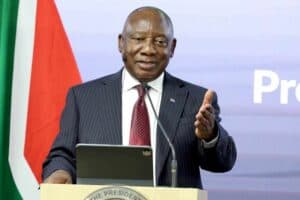The former Eskom CEO's credibility is in doubt after he refused to disclose the individual involved in Eskom corruption scandal.

After snubbing parliament’s request to disclose the individual he said was involved in corruption at Eskom – due to the “danger of legal action and security risks” – former CEO André de Ruyter’s credibility is on shaky ground.
De Ruyter was on Wednesday questioned by members of the standing committee on public accounts (Scopa) regarding corruption, theft, maladministration, sabotage and cartels at Eskom.
Corruption at Eskom
This followed his eNCA interview in which he said he had informed a Cabinet minister about corruption at the power utility, which involved a senior politician.
In parliament, De Ruyter refused to say which “senior politician” was involved, or at which government level the politician was involved in. He insisted that naming the person may compromise law enforcement investigations.
“There is a narrative in the media that there is a minister that I mentioned. “I must just avoid any doubt in this regard. I never made any statement to the fact that it is a minister. I said it was a senior politician,” he told Scopa.
Insufficient evidence from De Ruyter
The evidence used by De Ruyter to implicate top officials in government and the ANC in corruption was found wild and untested, according to investigative journalist Jacques Pauw, who said he had cancelled a book he was writing on Eskom.
Pauw – who came into possession of the research reports by George Fivaz Forensic and Risk – told Newzroom Afrika the report used by De Ruyter contained insufficient evidence to back up the claims he made.
“I started going through them and I realised there is no substance here. There is absolutely no evidence,” he said.
“I can understand why De Ruyter launched this investigation because we all know how useless law enforcement agencies are and there is some empathy for him that he was looking for private money to launch this investigation, but he took mere allegations and made wide accusations and stated it as facts.”
Not a first-hand account
Political analyst Goodenough Mashego said De Ruyter’s performance was not his best when realising most of his information was not first-hand.
“The fact that it was a report compiled by a former apartheid spy, somebody who could have [other] intentions, and a report funded from outside makes his reputation shaky,” he said.
He said De Ruyter not wanting to mention names did not make sense.
“The bigger question now was, if you are a whistle-blower, you should know whistle-blowers always give names.
“They believe what they are saying will stand in a court of law,” he said.
Information with no credibility
While De Ruyter claimed he had informed Public Enterprises Minister Pravin Gordhan and President Cyril Ramaphosa’s national security advisor, Sydney Mufamadi, of the information he had, Scopa has now confirmed it would invite the two to get more information on the allegations made by De Ruyter.
Political analyst Levy Ndou said De Ruyter appeared to rely on information with no credibility.
“He does not want to find himself in a web where he needs to account on something he is not sure of or has no credible source,” he said
Support Local Journalism
Add The Citizen as a Preferred Source on Google and follow us on Google News to see more of our trusted reporting in Google News and Top Stories.






